The huge Republican headache - and it's not Trump
- Published
- comments
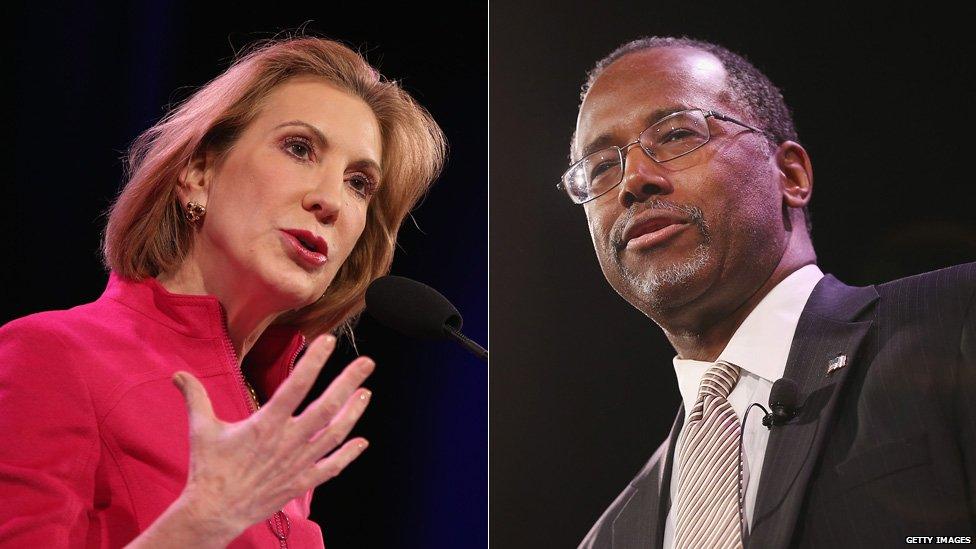
Candidates with little political experience like Carly Fiorina and Ben Carson have seen their poll numbers rise
The Donald Trump phenomenon may not be over yet. That, however, could be the least of the Republican Party establishment's concerns.
In an NBC News/Survey Monkey poll, external conducted the Friday and Saturday following the Republican primary debate in Cleveland, Mr Trump still sits well ahead of the pack with 23% support - up 1% from the previous week's results.
The poll, conducted online but using scientific methods, is an indication that, at least for now, Mr Trump's support appears to be holding strong despite - or perhaps because of - his unconventional debate performance and ongoing dispute with Fox News and presenter Megyn Kelly.
The real revelation from the NBC poll, however - and what should give Republican Party officials pause - are those who are climbing to the top of the pack behind the New York billionaire.
Texas Senator Ted Cruz is in second with 13%, followed by retired neurosurgeon Ben Carson at 11%. Florida Senator Marco Rubio and Carly Fiorina - the former corporate head who was an afterthought in the race before Thursday - are next with 8%.
Former Florida Governor Jeb Bush and Wisconsin Governor Scott Walker dropped from their previous second-place tie.
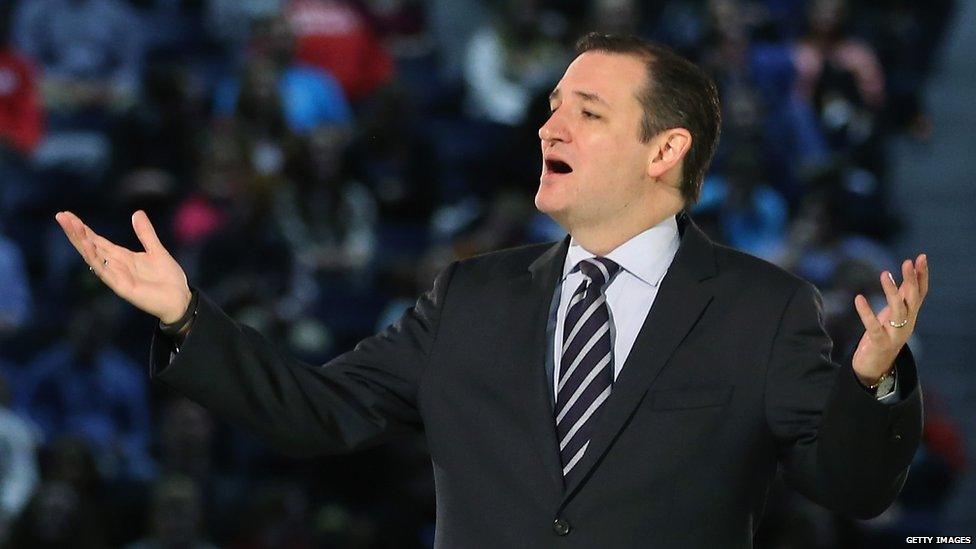
Texas Senator Ted Cruz, who has clashed with Republican leaders, placed second in a recent poll
Another poll, by Reuters/Ipsos, external, also has Trump way ahead, with twice as much support as Mr Bush.
More than 24 million Americans watched the prime-time debate among the top Republican contenders on Thursday. Another six million tuned in to see the rest of the field - including Ms Fiorina - face off earlier in the day.
And if the results of this survey are to be trusted, the candidates who are the least connected to insider Washington and the Republican Party apparatus are the ones who are flourishing.
Donald Trump, Ben Carson, Carly Fiorina - none has held elected office. Only Fiorina of those three has even run for office before, an ill-fated 2010 attempt to unseat Senator Barbara Boxer in liberal-leaning California.
The Republican rank and file appear to be turning against their party elders, and the only officeholder in the race who seems to be capitalising on this is Mr Cruz.
Last week he picked a very public fight with Senate Majority Leader Mitch McConnell. Mr Cruz was asked about it in the first round of questions during Thursday's debates, and the Texas senator didn't back down.
"If you're looking for someone… to agree with the career politicians in both parties who get in bed with the lobbyists and special interests, then I ain't your guy," he said.
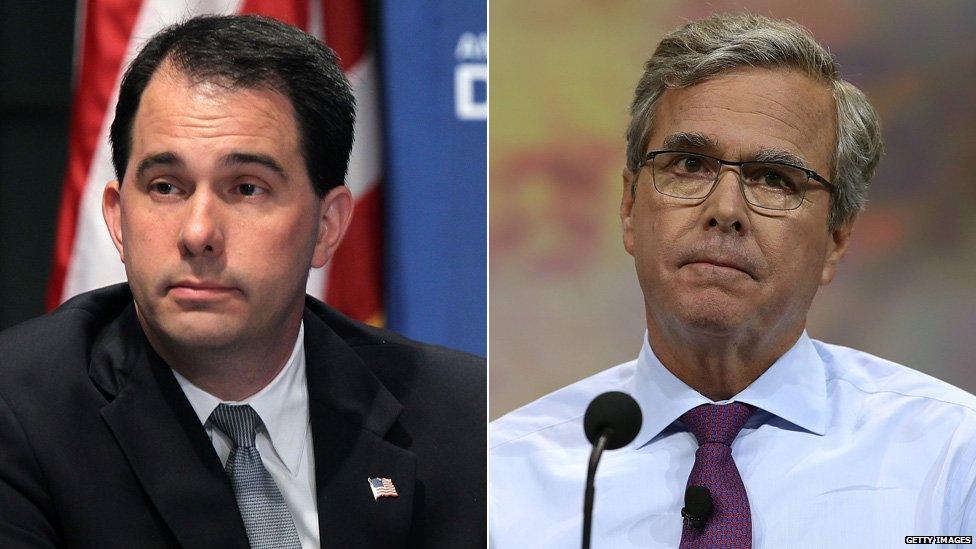
Candidates with strong financial backing like Wisconsin Governor Scott Walker and former Florida Governor Jeb Bush have seen their support wane
Mr Cruz scored points in the opening minutes of what was supposed to be the "gotcha" round, when candidates were put on the defensive. Mr Bush had to talk about his famous family name, Mr Trump was battered by accusations of sexism and Mr Rubio's experience and age were questioned.
Two days later, the Texan received the most spirited reception, external at the conservative RedState Gathering in Atlanta - an event that drew eight other Republican candidates and from which Mr Trump was prominently disinvited at the last minute.
Mr Cruz received multiple standing ovations. Congressman Jim Bridenstine of Oklahoma, who introduced the senator, got a standing ovation. It was a mutual love-fest that morning, and the moment that most enamoured the crowd was when the senator turned his fire on his party leaders.
"We win elections, and then the people we elect don't do what they say," he said. Republicans took the House of Representatives in 2010 and the Senate in 2014, he continued, and what exactly has this new Republican majority accomplished?
"Nothing!" the crowd shouted back.
"It's worse than that," he said. "In this case our team is playing for the other side."
This is the rhetoric from the politician who could now be positioned to pick up the pieces if - or more likely when - political gravity eventually exerts itself on Mr Trump and the other political neophytes currently garnering the headlines.
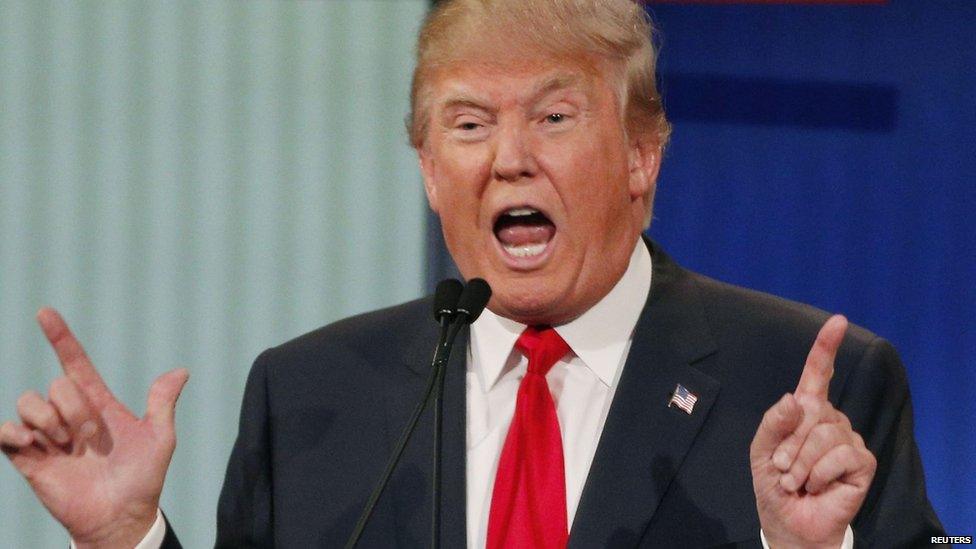
Donald Trump may have a lasting impact on the race even if he drops out
Mr Trump's campaign may not sustain itself, but "Trumpism", as the Washington Post's David Weigel, external terms it, may endure.
According to Glenn Reynolds, external, who writes the InstaPundit blog, the surge in the anti-establishment candidates is an indictment of the current US political system, which has become unresponsive to the concerns of the average American.
A similar process can be seen playing itself out on the left, as Vermont Senator Bernie Sanders draws tens of thousands to his rallies and liberal conferences like the Netroots Nation event in Phoenix last month are disrupted by #BlackLivesMatter protesters.
"Ruling-class Republicans have more in common with ruling-class Democrats than with the people they rule," Reynolds writes. Millions of voters feel "orphaned".
"Democracy doesn't do much for technocratically set policy that always seems to reflect ruling-class preferences, and people feel they've lost control of their own fates."
Twenty years ago the Republican Party went through a somewhat similar paroxysm of grassroots anger.
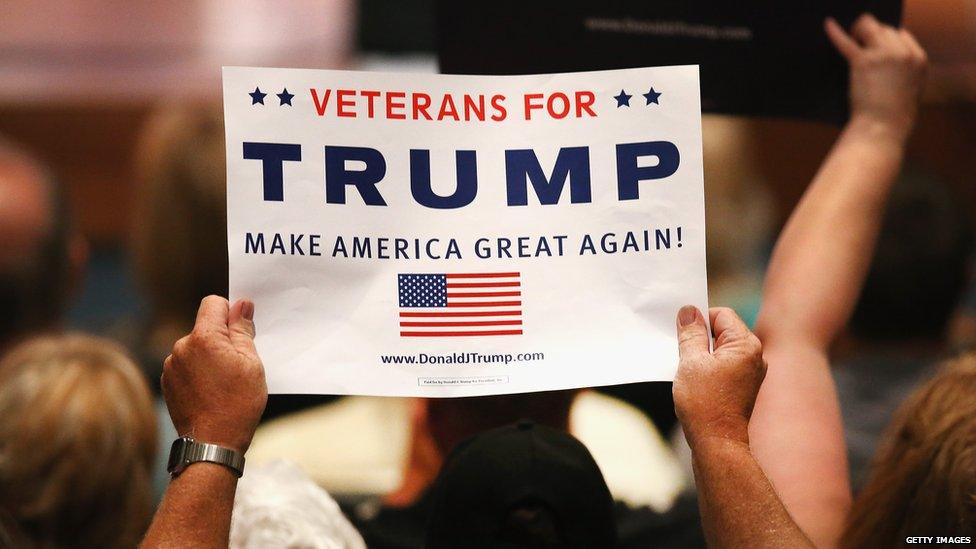
Insurgent campaigns are resonating with Republican voters
Senate Majority Leader Bob Dole, the establishment pick, was beaten in the 1996 New Hampshire primary by the insurgent populist campaign of former pundit/speechwriter Patrick Buchanan and what he called his "peasants with pitchforks" supporters.
"This is a victory for the good men and women of middle America who cannot understand why there is deafness in Washington and silence about the fact the standard of living of our working men and women in middle class have been stagnating, while profits have been soaring," he said in his victory speech, external.
The establishment, he warned, "is going to come after this campaign with all they've got". They did, quickly rallying behind Mr Dole, who went on to win the nomination - and handily lose to President Bill Clinton in the autumn.
The "peasants with pitchforks" appear to be restless again - on the left and on the right. Will they be beaten back once more?
It's a different political world than it was in the 1990s. Thanks to social media, grassroots organising and fundraising are considerably easier.
Mr Cruz, in many ways a rhetorical and philosophical heir to Mr Buchanan's movement, has raised $14m, external in direct donations to his campaign - more than any other Republican candidate - and another $37m for the "independent" committee that supports him.
Donald Trump can bankroll his campaign for as long as he wants. Ms Fiorina and Mr Carson are garnering more and more attention. And it's still just August, almost half a year from when the first votes are cast.
The "peasants" have plenty more to say - but who out there is listening?